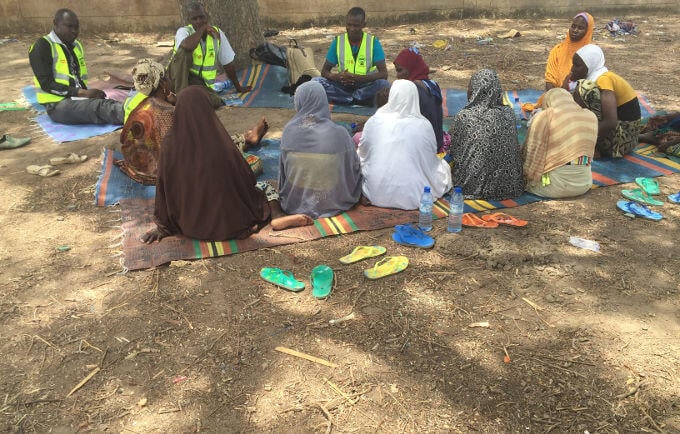The Makohi camp in Yola, Adamawa State in northeastern Nigeria is home to the 275 women and children who were recently rescued from the Sambisa forest – the , strongholds of the insurgency group, Boko Haram.
Prior to their rescue, the camp was home to about 845 Internally Displaced Persons. With the arrival of the recently rescued women and children, the camp now houses more than 1,000 people. On the surface it feels like normal life has resumed for many of the camp’s residents. Children playing in the field, joyful tales of family reunions shared among the women and girls. Such as Hauwa[ To protect the identity of the victims, their real names have not been used.], an adolescent who was reunited with her parents after seven months in captivity.
But for most, life is anything but normal. They are enduring the trauma of being abducted, abused and having their hopes dashed and future undermined. Some report having being raped. Others were forced to watch their husbands slaughtered, their homes burnt and their children abducted.
Hafsat Lai, a 26-year old and mother of three, recounts her story from the day she was captured. “When gunmen came to my village 11 months ago, killing everyone in sight, I thought I could escape. But I was wrong.” She explained that she was abducted in Yaza, under the Gwoza local government in Borno State. She said the day of her abduction was the last time she would be seeing her two sons, Bawa and Mohammed, 8 and 6 years old respectively, but she was left to care for her third son, 2 year old Ismail.
She said many other women were separated from their children as well.
“When the shooting stopped, we were all led like animals into the forest. I saw babies die and watched in pain as children were asked to bury them. In Sambisa forest, I was asked to renounce my religion or be treated as a slave. I refused, and I was flogged daily. I did the chores and was given maize and guinea corn peels to eat. At that time, it meant a lot because some days I had nothing to eat”.
There are also other tales of terror, such as that of a 24-year old woman who was abducted 5 months ago and was forced to marry one of the insurgents, making her his fourth wife, or the 16 year old girl who delivered in the forest without any medical aid.
Ms. Ratidzai Ndlovu, the Country Representative said “It is to these victims of insurgency that the United Nations Population Fund, is providing essential reproductive health services and psychosocial support, as well as counselling to begin the process of recovery and to ease the burden of re-integration into the society”.
Following the arrival of the women and girls, UNFPA delivered reproductive health kits to the nearest health facility to the camp. The kits contain supplies for safe delivery, rape treatment, pregnancy test kits and treatment of sexually transmitted infections (STIs). In addition, about 350 dignity kits, including 300 dresses have been provided.
Earlier on, UNFPA had trained a total of 183 health workers in the Minimum Initial Service Package for Reproductive Health in Humanitarian settings (MISP). These training sessions have enhanced the capacity of health workers to implement MISP and provide sexual and reproductive health services to the victims of insurgency. The Fund has also trained over 50 medical doctors and nurses in the Clinical Management of rape and an additional 121 health and social workers in psychosocial counselling.
As the military steps up its offensive against the insurgents, UNFPA is strengthening its services in anticipation of additional freed hostages and we are committed to safeguarding the health and dignity of the most vulnerable during this humanitarian crisis.


